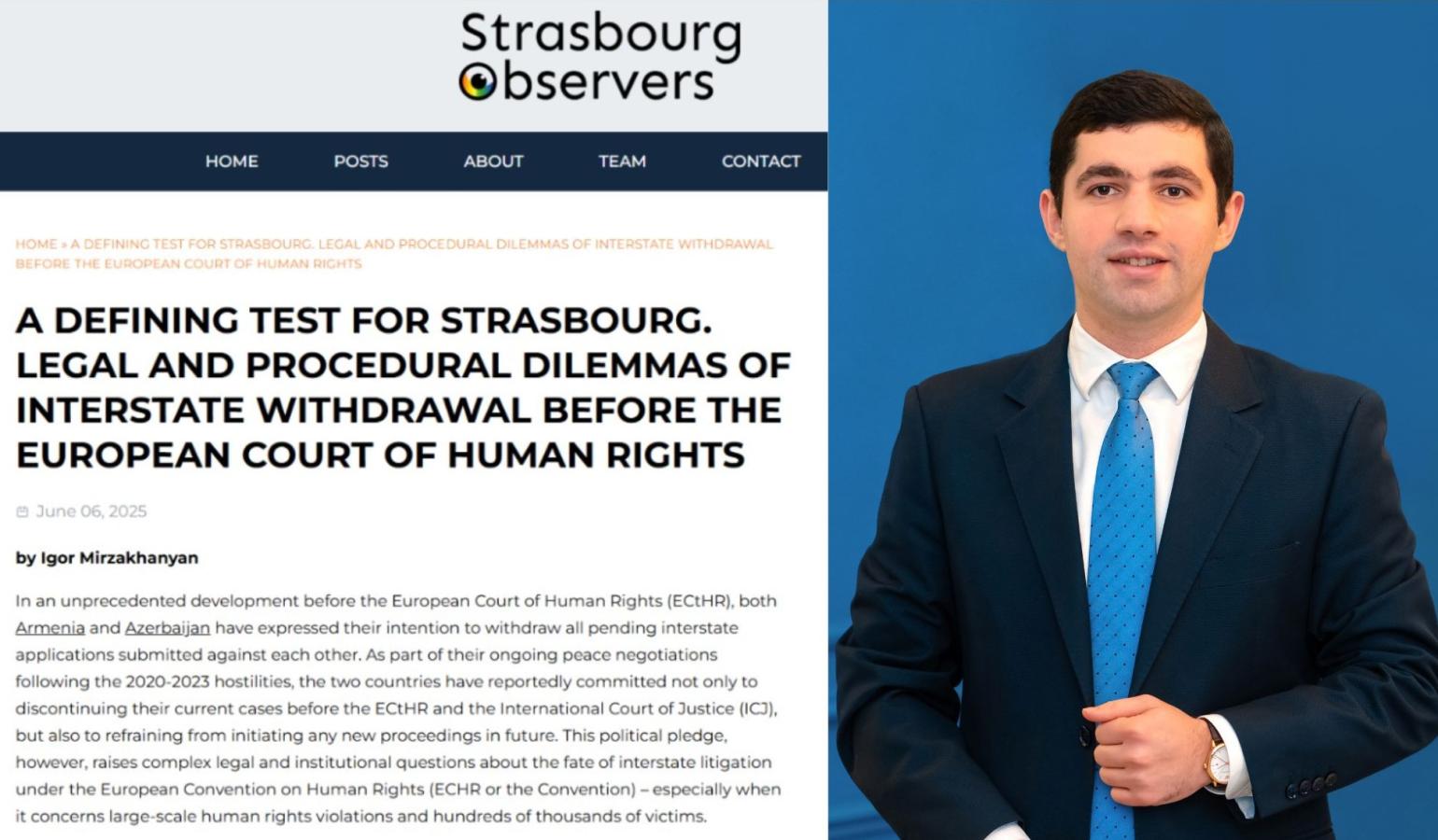
Six interstate complaints are currently being examined at the European Court of Human Rights (ECHR) between Armenia and Azerbaijan. All of these complaints stem from the context of the Artsakh conflict and relate to allegations such as extrajudicial killings, torture, violations of property rights, forced displacement, and restrictions on the right of return.
In March 2025, Armenia and Azerbaijan announced the conclusion of negotiations on the "Agreement on the Establishment of Peace and Interstate Relations between the Republic of Armenia and the Republic of Azerbaijan." Although the full text has not been made public, statements from the foreign ministries of both countries confirm that, upon the agreement's entry into force, the parties intend to withdraw all existing interstate cases from the ECHR and undertake not to initiate further proceedings related to past events. Igor Mirzakhanyan, a research fellow at the Armenian Genocide Museum-Institute and co-founder of the Armenian International Law Association, published an article on the Strasbourg Observers scientific blog, detailing the history of mutual claims between the two countries and the consequences of their withdrawal in the context of a potential peace agreement.
"If the claims are withdrawn, it will be an unprecedented case of collective withdrawal of numerous interstate cases from the ECHR, within the framework of seeking a political settlement. Given the scale of the alleged violations and the number of affected individuals, the situation raises significant legal and procedural questions, not only within the ECHR framework but also concerning broader principles of truth, accountability, and access to justice for victims. All these cases collectively refer to alleged violations of the rights of hundreds of thousands of individuals," wrote Mirzakhanyan.
He also emphasized that the legal framework governing the withdrawal of claims at the ECHR is relatively incomplete, and the rules applicable to interstate complaints are more general and vague. However, when there is mutual agreement, as in this case between Armenia and Azerbaijan, the Court can strike the application from its list of cases. "Thus, although procedural provisions exist to allow the withdrawal of interstate complaints, the final decision rests with the Court."
Is Justice Delayed, Denied, or Delivered?
Interstate complaints at the ECHR are intended to protect the rights of individuals who cannot otherwise obtain justice. The ECHR's legal practice has reaffirmed that even in interstate cases, the primary "aggrieved party" remains the individual whose rights have allegedly been violated. Accordingly, interstate applications are submitted to protect the rights of affected individuals, and the applicant state assumes the obligation to act on their collective behalf.
"This obligation should not be jeopardized by political considerations or procedural expediency, especially when, as in this case, the scale and severity of the alleged violations demand ongoing judicial scrutiny. While the decision to withdraw remains within the sovereign discretion of states, such a step should not come at the expense of the rights and considerations of hundreds of thousands of individuals," noted the human rights advocate.
Those who are likely to be affected by the withdrawal of claims have already expressed their concerns. More than three dozen non-governmental organizations, along with groups of human rights defenders and activists, have publicly expressed their opposition to the cessation of interstate cases. Although individual complaints could, in theory, remain an option, in practice, many victims cannot file individual claims due to displacement, lack of information, or fear of reprisal.
"The decision by Armenia and Azerbaijan to withdraw interstate complaints may indeed reflect a desire for reconciliation. However, for the ECHR, it raises questions: Can justice be suspended or cancelled by political consensus? Should interstate proceedings be viewed merely as a matter of state discretion, or as an integral part of a broader commitment to the Convention system?
In an era where accountability and history are as contested as physical territory, the ECHR faces crucial challenges: to uphold the relevance of interstate proceedings and protect the rights of victims, even when states decide to withdraw from the process," concluded Igor Mirzakhanyan.
Article: